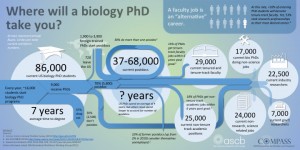By Yaa Haber
I recently met a PhD advisor and his student at a conference who afforded me a unique insight about their relationship. I was struck by the level of openness in their communications as well as by the fact that both were on the same page regarding the student’s decision to pursue a future in industry instead of academia. There was something fluid about the way Bob* explained his plan to start his own instrumentation company post graduation. His advisor, Dr. Grant* was in full support. Apparently from the first day that Bob walked into the lab, he made it known that he had previously worked in industry, and his plan was to return after he obtained his PhD. His advisor spoke highly of Bob’s scientific achievements and was in full support of Bob’s career goals.
I relate closely to Bob since I also clearly expressed my intent to pursue a career in industry after graduation. My advisor has also been supportive, and this significantly impacts the types of opportunities I have pursued in preparation for my next career step. I would not have had the opportunity to participate in iJOBs or the SciPhD course if I did not have this discussion. While like Bob, this level of support has made my preparation, much easier; I have realized that this support does not exist for many of my colleagues.  One of the things that I have observed when asking my colleagues about their next career step is the similarity of their mannerisms with which they express their reply. A generalized conversation looks and sounds like this: Them: They lean in towards me, lower their voices significantly, and barely whisper, “I’m probably going into industry.” Me: “Oh really? I thought your original plan was to go into academia.” Them: “Well, I see how my advisor struggles to keep the lab open by re-writing the same grant over and over in hopes of it being funded, and I am not sure that’s the lifestyle I want.” This is a fair response that tells me a couple of notable observations about the students and their advisors: Firstly, the students have gone through the journey of self-discovery for themselves and have learned what type of lifestyle they want after their Ph.D. Secondly, the students have also learned that the journey to tenure is one laced with much adversity and have come to grips with the fact that a tenure track career is not meant for everyone. In fact, there have been several studies that have shown dramatic growth in the number of PhD graduates and postdocs coupled with very few available tenure track positions. About one third of students go on to pursue a tenure track position. Thus, the likelihood to achieve a tenured faculty position is not favorable for most scholars.
One of the things that I have observed when asking my colleagues about their next career step is the similarity of their mannerisms with which they express their reply. A generalized conversation looks and sounds like this: Them: They lean in towards me, lower their voices significantly, and barely whisper, “I’m probably going into industry.” Me: “Oh really? I thought your original plan was to go into academia.” Them: “Well, I see how my advisor struggles to keep the lab open by re-writing the same grant over and over in hopes of it being funded, and I am not sure that’s the lifestyle I want.” This is a fair response that tells me a couple of notable observations about the students and their advisors: Firstly, the students have gone through the journey of self-discovery for themselves and have learned what type of lifestyle they want after their Ph.D. Secondly, the students have also learned that the journey to tenure is one laced with much adversity and have come to grips with the fact that a tenure track career is not meant for everyone. In fact, there have been several studies that have shown dramatic growth in the number of PhD graduates and postdocs coupled with very few available tenure track positions. About one third of students go on to pursue a tenure track position. Thus, the likelihood to achieve a tenured faculty position is not favorable for most scholars.  Thirdly, I have noticed from these conversations is that most of these students have not shared their plans with their advisors. If the data increasingly show that most graduate students who complete a post doc do not ultimately obtain a faculty position, then why can’t graduate students simply tell their advisors that they will not be pursuing a career in academia? In my experience the responses to this question are mixed: sometimes students have previously shared their pursuit of academia with their advisor, and even though they have changed their minds, feel that there is no need to inform their advisors of that change. Another reason is that some students report observing that labmates who share their true intentions following graduation are treated differently and do not want to risk experiencing poor treatment. Fourthly, some advisors are not familiar with possible job options outside of academia, and students therefore do not feel it worthwhile to share. These are merely a few reasons within the complex issue concerning communication between an advisor and a graduate student. Yet, it highlights a systemic problem that is surfacing when students are preparing their next steps following graduation. This is not an easy issue but there is a need to start the conversation. So what should you do if you find yourself in this awkward position? My advice is:
Thirdly, I have noticed from these conversations is that most of these students have not shared their plans with their advisors. If the data increasingly show that most graduate students who complete a post doc do not ultimately obtain a faculty position, then why can’t graduate students simply tell their advisors that they will not be pursuing a career in academia? In my experience the responses to this question are mixed: sometimes students have previously shared their pursuit of academia with their advisor, and even though they have changed their minds, feel that there is no need to inform their advisors of that change. Another reason is that some students report observing that labmates who share their true intentions following graduation are treated differently and do not want to risk experiencing poor treatment. Fourthly, some advisors are not familiar with possible job options outside of academia, and students therefore do not feel it worthwhile to share. These are merely a few reasons within the complex issue concerning communication between an advisor and a graduate student. Yet, it highlights a systemic problem that is surfacing when students are preparing their next steps following graduation. This is not an easy issue but there is a need to start the conversation. So what should you do if you find yourself in this awkward position? My advice is:
- Be honest with your advisor. Most advisors recognize the need to choose a career that suits their student, even though they may be slightly disappointed that you are not choosing the same career path that they have.
- Make your intentions known as early as possible. I was upfront with my advisor from the beginning about my goals. This made ongoing conversations about my future career a little easier.
- If you have changed your mind mid-stage in your career, it’s never too late to say so. It is perfectly okay to change your mind. Graduate school is a great place for self exploration. Allow yourself to change your mind and let others, including your advisor know that this is the case. Don’t forget to explain why you have changed your mind. When they know your reasoning for your decision, they are more understanding.
 *While these names are fictitious to protect the individuals, these situations are based on real events.* Referenced Articles and Additional Reading: https://www.bloomberg.com/view/articles/2015-04-22/the-downside-of-the-bull-market-in-graduate-school http://www.nature.com/news/2011/110420/full/472276a.html https://elifesciences.org/content/5/e17393 http://thegradstudentway.com/blog/?p=1601 http://www.ascb.org/2014/04/11/where-will-a-biology-phd-take-you/
*While these names are fictitious to protect the individuals, these situations are based on real events.* Referenced Articles and Additional Reading: https://www.bloomberg.com/view/articles/2015-04-22/the-downside-of-the-bull-market-in-graduate-school http://www.nature.com/news/2011/110420/full/472276a.html https://elifesciences.org/content/5/e17393 http://thegradstudentway.com/blog/?p=1601 http://www.ascb.org/2014/04/11/where-will-a-biology-phd-take-you/
